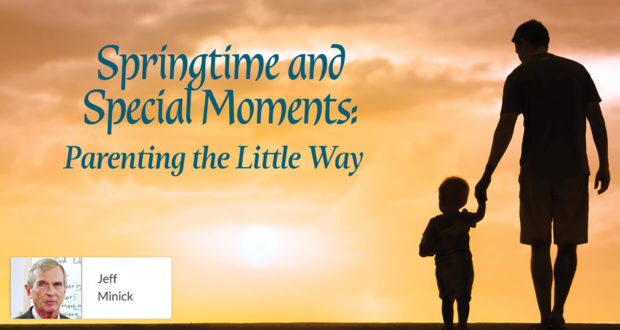Summary
Life is filled with opportunities and moments to share with our kids and at the end of the day we will look back and say we spent those moments most wisely.Recently a friend, an older homeschooling father, lamented that he hadn’t spent more time with his children when they were young.
He’d kept his nose to the grindstone all his adult life—he once heard a daughter say of him, “Dad shows his love for us by working”—and now wishes he’d devoted himself more to playing with his kids. He told me, “No one on his deathbed ever says, ’I spent too much time with my children.”
Many moms and dads—and I include myself in this company—may experience this same regret. One morning we wake up, and that kid we used to tuck into bed with prayers and a kiss is all packed up and off to college, or to join the military, or to take a job on the other side of the country.
Obligations sweep up our time and energy, every day seems a race to earn money, get the laundry done, or put a meal on the table, and the days, months, and years click past us like a freight train.
These lines from Fiddler on the Roof’s “Sunrise, Sunset” sum up this sensation:
Is this the little girl I carried?
Is this the little boy at play?
I don’t remember growing older
When did they?
When did she get to be a beauty?
When did he grow to be so tall?
Wasn’t it yesterday
When they were small?
Sunrise, sunset
Sunrise, sunset
Swiftly flow the days.
Yes, those days race past us in the blink of an eye.
In most homeschooling families, I suspect, one or even both parents may spend time, like my friend, working outside of the home. How might they snatch some moments from that flow of days and insert themselves more deeply into the lives of their children?
Misguided Disagreements
Years ago, when I was parenting my children, a debate raged between the benefits of quality time versus quantity time.
Some experts stressed the importance of “quality time” to reassure working moms and dads that they weren’t missing out on their children’s development. Other experts in the “quality time” camp emphasized that the number of hours you spent with the kids mattered less than how you spent that time together. An evening devoted to reading books to a 5-year-old along with some conversation or games could offset the forty hours the child had spent in pre-K care that week.
On the other hand, those who argued for quantity time believed what mattered more was the number of hours children and a parent were together. The interactions during the day between a parent, most often a stay-at-home mom, and young children counted more heavily in a child’s development. They contended that presence mattered most.
Let’s assume for the sake of my argument that parents on both sides of this question love their children and want the best for them. Let’s also assume that some of these parents, particularly those on the quality side of the debate, have little choice in whether they must work or remain at home.
Keeping those assumptions in mind, let’s move past the quality versus quantity discussion, and look instead at how moms and dads working outside of the home can connect with their children and make the most of the flow of days.
The Little Way
Saint Thérèse of Lisieux became famous for her practice of The Little Way. This French Carmelite nun who died from tuberculosis at age 24 taught the rest of us the value of doing small things for God with great devotion. She is an exemplar of what it means to offer all our prayers, all our actions, and all our love to the God who created us.
So what, you might be wondering, does the Little Way have to do with work and parenting?
Just about everything.
Christ sees the father who comes home beaten up by a day at the office and worried about putting bread on the table for his family, but who still manages to throw a football in the yard with his 12-year-old son. Christ sees the exhausted mother who works part-time as a nurse sitting beside the bed of her feverish daughter, offering her sips of water and praying over her when she finally falls asleep.
By the time the kids are grown, most parents have forgotten these myriad moments of grace. Nonetheless, they are real, true, and beautiful, and they add up to a pile of riches over the years.
The Perfect Season to Start
Spring is fast approaching. The frozen earth of winter is unlocking, the days will grow longer, the grass will soon turn green, and flowers will send forth shoots and buds.
Now is the perfect season to add to that treasure house of riches.
Now is the time when parents arriving home from work have the daylight hours to kick a soccer ball with the younger set, spend a few minutes playing catch, go on a family stroll, or set up a target and pop off some BBs in the back yard.
The time needed for these shared activities is negligible in the broad scheme of life but can provide wonderful memories for our children and teens.
Being outdoors together this way is healthy for the entire family.
And this time together, this casual expenditure of minutes, helps forge lifelong bonds.
Sunshine and Simplicity
Long ago, on another spring day, I was 15 feet up a ladder, painting the side of the bed-and-breakfast my wife and I owned, when my five-year-old daughter grabbed the bottom of the ladder and shook it. She scared the heck out of me—I acquired more gray hairs that afternoon—and I shouted, “Do you want me to come down off this ladder?”
She missed the threat implied in my question. “Yes,” she said. “I want you to come and play.”
Her innocent request touched my heart. I laughed, came down from the ladder, wrapped my paintbrush in cellophane, and we kicked a soccer ball back and forth for a few minutes.
I wish I could say I had done this more often with all my children, come down from other ladders both real and metaphorical to spend time with them, for that moment was magical. For once, I practiced the Little Way.
It’s spring again now. Get the kids outside—it’s good for them—but even more, get yourself outside with them.
That’s good for you too. In more ways than one.
And to the man whose daughter said of him, “Dad shows his love for us by working,” I would say: That’s not a criticism.
No—it’s a high compliment from a wise young woman who loves you.

 Seton Magazine Catholic Homeschool Articles, Advice & Resources
Seton Magazine Catholic Homeschool Articles, Advice & Resources

